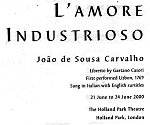Opera Holland Park is London's Glyndebourne, the small park as beautiful as the Sussex gardens, with good facilities for refreshments and picnic hampers, and (this year) an interesting outdoor contemporary sculpture exhibition to walk around, worth a visit on its own.
L'amore industrioso is real discovery by this conductor, though more people might have come to the last night, despite cool inclement weather, if The Independent had not seen fit to suggest that Iberian music is no better than English football! Comparison of 'Portugal's leading 18th-century composer' with 'England's top footballer' perpetuates the complacent Anglocentric myth that there is little needing our serious attention before or since Albeniz and Falla, as I have discovered trying to promote in UK Spain's leading 20th-century composer Luis de Pablo.
Many operas are remembered only through their overtures. David Chernaik conducted the overture to João de Sousa Cavalho's L'amore industrioso, sought out the rest of it in a Lisbon library, and was delighted by its consistent high quality and close stylistic links with Mozart's late operas.
Stock commedia dell'arte characters were developed by Goldoni into people with real feelings in his plays and libretti and he even invented the ensemble finale, brought to such perfection by Da Ponte and Mozart. Young Portuguese composers went to Italy to learn how to write Italian operas, all the vogue. Mozart developed his masterpieces from a flourishing existing style, and this opera, to a libretto by Casori, is typical of those upon which he modelled his own. Joseph Doll, one of Carvalho's teachers, lunched with Mozart, and Chernaik fantasises that he might have drawn attention to this work with its Basilio, Count, Countess, fake notary and clever servants.
Carvalho is renowned for his serious music, religious works and opera seria, but the existence of this 'excellent example of opera buffa' escaped the lexicographers of New Grove. In a warm, affectionate context it explores the ways of society and class relationships, and the importance of money, leading through a multitude of comic vicissitudes towards eventual supposed married bliss for three couples.
Musically it went very well indeed, with good teamwork by the excellent cast of young singers. The two lead lovers, Richard Edgar-Wilson and Rebecca Watson (who had been unable to sing at the first performance) were convalescent from colds and sounded fully recovered. Their light voices blended well and were favoured by the acoustic of the Holland Park tented theatre (a far more elegant construction than the ill-fated Dome!). Jonathan Gunthorpe and Richard Burkhard did well as a double act of socially aspiring merchant, Basilio, and impoverished aristocrat. Claudia Pererira Pinto, from Porto, was the the pawn in the marriage plots for whom all came right in the end. Catriona Barr and Kevin Kyle were entertaining representatives of the servant class. The youthful musicians of the Apollo Chamber Orchestra gave just the right support, and were conducted with real flair and flexibility by David Chernaik.
Picture by Caroline Blackburn
Sur-titles were welcome, but hard to read in the first part of the evening. As the light faded, and it became harder to read the synopsis in the lavishly produced programme (full of illuminating essays and illustrative interpretations of the operas by Caroline Blackburn) the sur-titles became more visible! It was explained to me that they had bought the Polycom sur-title system and might do better with the more expensive laser generated Focon system if it could be afforded!Sarah Alexander's production was too fussy for some, but I thought it perfectly updated, in the spirit of the populist commedia dell'arte, and I thoroughly enjoyed the inventive knock-about. It was produced for half-a-shoestring, with no more than six doors purpose-made for the scenery. The wide stage was used to full advantage and apart from the series of disguises, three energetic actors supplied all the waiters, servants creditors and soldiers called for.
David Chernaik will be taking his precious discovery to Porto in July as part of its celebrations for being chosen as European City of Culture. This is the sort of opera which might have attracted a lot of attention at Wexford or Buxton, and it is good news that a studio CD is on the way. David Chernaik's highly rated recording with this orchestra of Mendelssohn's Symphonies 3 & 4 is on MeridianCDE 84261.
Peter Grahame Woolf

 Return to:
Return to: